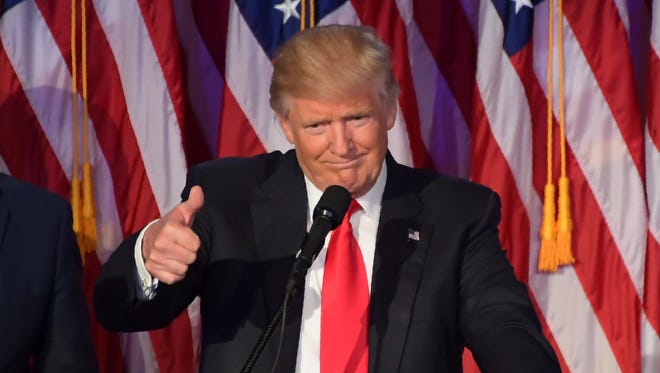Trump's aim in his inaugural address: National unity

Donald Trump is a different kind of president-elect, but his very first words as president — his inaugural address — will likely echo a theme used by many predecessors.
National unity.
Having won an angry campaign, and now facing low approval ratings after a tumultuous transition, Trump plans to use his first speech as president to try to soothe tensions, according to aides.
"He wants to continue to talk about issues and areas where he can unite the country — bring it together," said Trump transition spokesman Sean Spicer.
Trump himself is working on what aides expect to be a relatively short inaugural address — possibly less than 20 minutes — with the help of longtime speechwriter Stephen Miller and other aides. Associates said the president-elect has practiced with podium and teleprompter and can be expected to reference ideas from his campaign such as "America First" and the need to "Make America Great Again."
To be delivered from the west front of the U.S. Capitol after his formal swearing-in, Trump's opening remarks will be closely watched by people who remain suspicious of the president-elect. His transition featured frequent clashes with intelligence agencies, political opponents and reporters, particularly over evidence that the Russians interfered in the election by hacking emails from Democrats close to Hillary Clinton.
Only 40% of respondents in a recent Washington Post/ABC News poll approve of the way Trump handled the transition, making him the least popular incoming president of the last seven chief executives. More than 40 congressional Democrats have said they plan to boycott the proceedings.
Read more:
The best (and worst) inaugural addresses
Trump's inauguration will be protested in all 50 states and 32 countries
Trump: Approval rating polls are rigged, too
In calling for national unity, Trump will trod familiar ground for new presidents.
Since George Washington took the first presidential oath of office in 1789, new presidents have often used inaugural addresses to try to bring the country together, especially in times of national stress. From the emergence of the two-party system to the Civil War to the Great Depression to more recent economic and military challenges, the most remembered inaugural addresses are products of their times.
Ronald C. White, a biographer of Ulysses Grant and Abraham Lincoln, said the speech should not be a "laundry list" of policy proposals but instead seek "an emotional kind of resonance" with all listeners. "It tries to lift the nation," he said.
As Trump puts together his speech, he may want to remember another key to memorable political rhetoric: great lines.
When historians think of inaugural addresses, they recall words like "with malice toward none, with charity for all" ... "Ask not what your country can do for you, ask what you can do for your country" ... "The only thing we have to fear is fear itself."
"People think they remember the speeches," said Robert Lehrman, a former speechwriter for Vice President Al Gore who now teaches public communication at American University in Washington. "Most people just know phrases."
A different kind of speech
It's a different kind of speech for Trump, who employed an informal (and aggressive) speaking style during his successful presidential campaign.
While candidate Barack Obama and aides made extensive use of social media during their 2008 and 2012 campaigns, no presidential aspirant has deployed Twitter the way Trump did, and still does. Trump uses his Twitter feed to attack critics and advance general policy views.
Trump did use a basic speech for his many campaign rallies, but he often veered off text, especially toward hecklers, It's unknown whether there will be any of those Friday, at least within earshot of the newly sworn-in president.
The closest thing to an inaugural address that Trump has done: his acceptance speech at the Republican convention in July. But that was obviously a partisan set of remarks; inaugural addresses are usually designed to be more neutral in tone.
White, the author of American Ulysses: A Life of Ulysses S. Grant, said Trump is more of a "spontaneous" speaker, and his style is hard to assess in terms of such a formal event as an inaugural address.
"With a prepared text," White said, "it's hard to know what's going to really happen."'
Read more:
Donald Trump to be sworn in on Lincoln, family Bibles
The best (and worst) inaugural addresses
What time is the inauguration on Friday? See full schedule of events
As he prepared for his big moment at the Capitol, aides pointed to another prepared Trump speech: his declaration of victory in the early morning hours after Election Day.
After a brutal campaign — and winning the Electoral College but losing the popular vote — Trump said then that "it’s time for America to bind the wounds of division" and that he would try to bring together "all Republicans and Democrats and independents."
He added that morning: "I pledge to every citizen of our land that I will be president for all Americans, and this is so important to me."
Spicer said the speech and all the events around it have a major goal: "It is going to be an inaugural for all Americans."
Stay with USA TODAY for full coverage of the 2017 inauguration.
